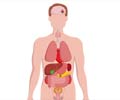Mutations in a single gene have been linked to autism in people who have this rare tumor syndrome typically diagnosed in childhood.

‘Mutations in a single gene have been linked to autism in people who have this rare tumor syndrome typically diagnosed in childhood.’





About 100,000 people in the United States have neurofibromatosis type 1. Autism, meanwhile,
affects 1% to 2% of all children in the United States and
is four to five times more common in boys than in girls. The findings, in patients with NF1, may lead to a better understanding of the genetic roots of autism in the wider population. The findings are published in the journal JAMA Psychiatry.
Studying 531 patients at six clinical centers in the United States, Belgium, the United Kingdom and Australia, the researchers found that mutations in the NF1 gene that cause the disease also contributed to autistic behaviors in almost half of the patients.
"NF1 is caused by mutations in a single gene - NF1," said first author Stephanie M. Morris, an instructor in neurology. "Our research indicates that this single gene also is associated with autism spectrum disorders in these same patients. That may make it possible to look downstream from the gene to find common pathways that contribute to autism in the wider population."
NF1, the disorder caused by NF1 mutations, usually appears during childhood. Symptoms can vary in severity, but they include café au lait spots, which are flat, brown spots on the skin. Other symptoms include tiny nodules on the iris of the eye, nerve tumors, bone deformities such as a curved spine or a bowed lower leg, and optic gliomas, tumors of the optic nerve. Kids with NF1 also can have learning disabilities.
Advertisement
The findings also could help scientists who study the genetics of autism understand how mutations in a single gene can contribute to symptoms of autism, such as problems with social and language skills and repetitive behaviors.
Advertisement
Constantino said most autism spectrum disorders are influenced by multiple genes but that isolating this one gene can aid efforts to learn how other, unrelated genes may interact along that same pathway to contribute to autism in people who don't have NF1.
Learning how those various genes come together to cause symptoms eventually could lead to better treatments. But already the findings are benefiting children and families treated at the Washington University NF Center.
"We've been able to screen children at our center, identify autism spectrum disorder, attention-deficit disorder and problems with executive cognitive function," Morris said. "And when we identify these deficits in kids, we can tell their parents, inform their schools and enable these children to get the resources and support they need - specifically academic and social support - to improve their quality of life."
Source-Eurekalert















